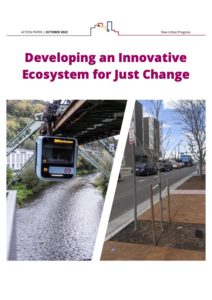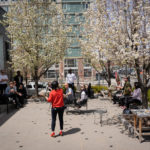The massive disruption of urban life through the Covid pandemic opened a window of opportunity to fundamentally rethink city infrastructure and governance. In many places, streets were reprioritized for cycling and green spaces gained new importance. At the same time, Covid unveiled and deepened existing inequalities. The New Urban Progress fellows explored how cities can create an innovative ecosystem for just change by focusing on mobility, housing and civic engagement.
Rethinking Urban Mobility
The action paper makes a strong case for how urban mobility can make impactful, yet quick strides towards a more just city and urban environment. Below are five to-do’s that cities can focus on. Read the full paper for examples from the program’s travels and how micro mobility is symbiotic with an innovative ecosystem.
Five To-Do’s for Micro Mobility
- Fixed locations: fixed stations for shared micro mobility devices to avoid clutter
- Redistribution of Space – Push & Pull: redistribution of former parking lots to micro mobility spaces to ease the usage of micro mobility and reduce the need for car trips
- Dense Networks: dense networks of shared micro mobility hubs for high user acceptance
- Funding Schemes based on Sustainability Assessments: funding schemes based on a sustainability assessments (people, planet, profit), which gives incentives to providers to serve all pillars of sustainability like financial and spatial accessibility
- Mass Integration: one stop shop solutions enable the usage of a single platform to use all means of public transport and micro-mobility
New Approaches to Affordable Housing
Rising costs for housing continue to be a key issue in urban areas in Germany and the United States. In the action paper below, the authors propose several successful examples of cooperation between the municipality, private sector and civil society and how they find sustainable solutions to meet rising demand. Read below for examples on how cities can just change their housing policies from Wuppertal, Buffalo, Berlin, and more!
Meaningful Citizen Engagement
Public engagement is at the core of any democratic government. Yet, in the 21st century, it’s important to leverage the opportunities to better engage citizens to shape our cities. What should just community engagement and participatory planning look like? The authors reflect on the insights they gained from their trips to the United States and Germany about how city administrators are thinking about the role and future of citizen engagement. They offer several approaches on how citizen engagement can be meaningful and contribute to an innovative ecosystem capable of just change.

The Authors
- Alexander Czeh – Research Assistant at the Institute of Transport Research of the German Aerospace Center (DLR) and Consultant for Cargoroo.
- Julia Diringer is Research Assistant at the German Institute of Urban Affairs (DIFU)
- Andrea Gonzalez is an Urban Planning Consultant at the Consultancy Guidehouse in Philadelphia
- Steffen Haake is Senior Consultant for Dataport Aör in Bremen
- Alison Noehrbass is pursuing a Graduate Diploma in Law at BPP Law School in London


